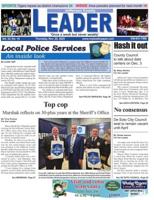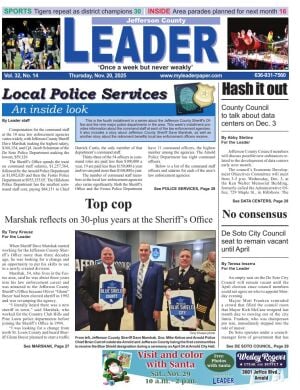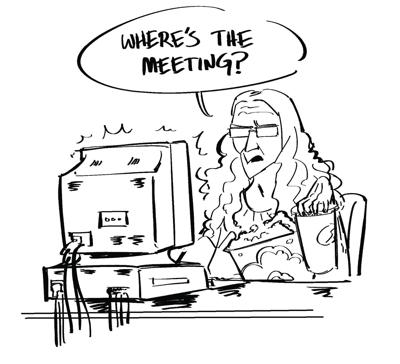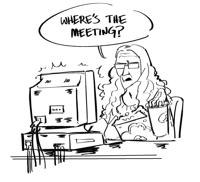COVID-19 has impacted our lives in so many ways.
With about 750,000 Americans dead from the virus, many of us have lost a dear family member or friend to the dreadful disease.
A lot of us have contracted the virus ourselves, resulting in days or perhaps even weeks or months of recuperation.
Of course, many people have suffered financially as well, losing jobs or businesses because of the pandemic and related shutdowns or other restrictions put in place to curb the spread of the coronavirus.
While most of the effects from the pandemic have been horrible, a few bright spots have emerged for some, like making the switch to working remotely from home, giving people more time with their families.
One of the less obvious benefits of the pandemic has been more accessible governmental meetings.
When stay-at-home orders were issued and city council and school board members began holding meetings via Zoom or other internet-based teleconferencing programs, many of the entities also livestreamed their meetings, giving the public a chance to watch them in action without having to attend a meeting in person.
After a few hiccups, most of those governmental entities became adept at livestreaming their meetings, and many even downloaded those meetings to YouTube or archived them elsewhere, which allowed people to watch the meetings later if they couldn’t see them live.
Most local boards have since resumed in-person meetings, but some have wisely taken the extra step to continue livestreaming the meetings, recording them and making them available to the public online.
I encourage all entities to adopt the practice.
We know they have the know-how to make it happen, so there’s no reason not to.
Whenever local elections roll around, political candidates and entities almost always espouse their desire to be more transparent. If they’re serious about that pledge, livestreaming and archiving meetings is one of the easiest ways to accomplish that goal.
The Jefferson County Health Department knows better than almost any other governmental entity in the area how much interest a board meeting can attract.
After the pandemic struck and the Health Department began recommending measures to slow the spread of the virus – social distancing, wearing masks and getting vaccinated – people began showing up at its meetings to champion or oppose those steps.
When the shutdown happened, the Health Department, like boards across the country, stopped holding in-person meetings, and it began livestreaming its meetings on Facebook.
Health Department officials were probably surprised at first to see hundreds, if not thousands, of people joining in online to watch and comment about the meetings, which often became heated as board member Suzy Davis challenged nearly every finding or recommendation related to COVID-19.
The Health Department still livestreams its meetings, and they’re archived on YouTube, which is necessary since the board room literally has no room for the public to come and watch in person.
While it’s great those meetings are available online, the Health Department could build some much-needed goodwill by also finding a space large enough to hold meetings so those who want to show up in person can do so.
Even before the pandemic, the Jefferson County Council recorded its meetings and posted them not too long afterward so people could watch them later. The county’s Planning and Zoning Commission, which makes recommendations about important development and land-use issues, should follow suit and make its meetings available online, too.
Several of Jefferson County’s cities provide the public a chance to watch their meetings online.
The Arnold City Council recorded meetings and posted them online long before the pandemic hit, and afterward began livestreaming their meetings. However, those meetings haven’t been archived lately, but City Administrator Bryan Richison said the city plans to update its technology so it’s easier to post those meetings online again.
Both the Festus City Council and Eureka Board of Aldermen livestreamed their meetings during the shutdown and continue to do so, helping the public keep up with happenings in those two municipalities.
The Pevely Board of Aldermen doesn’t livestream its meetings, but they are recorded and archived on the city’s website.
The Byrnes Mill Board of Alderpersons hasn’t resumed in-person meetings, but it holds meetings via Zoom and people may watch them live. However, they’re not archived for later viewing.
The Herculaneum Board of Aldermen members gather for their meetings, but the public may not attend them. The meetings are livestreamed, however.
The De Soto City Council meetings are neither livestreamed nor recorded, making them some of the least accessible in the area.
As far as school districts are concerned, the Festus R-6, Fox C-6, Hillsboro R-3, Jefferson R-7 and Rockwood school districts set good examples, both livestreaming and archiving their meetings.
The practice recently caused a little controversy for the Rockwood School District, though, when YouTube took down at least one of its posted meetings, claiming some people who spoke at the meeting spread misinformation about COVID-19, violating the social media company’s policies. Rockwood appealed the removal, and the recording was restored.
Unfortunately, the De Soto, Northwest R-1 and Windsor C-1 school districts do not livestream or record and archive their meetings. The Northwest district does, however, pay a service to livestream its football games.
I urge all governmental entities, big and small, to provide taxpayers a front-row seat, both in-person and online, to the meetings they hold and the important decisions they make. If they’re working in their constituents’ best interest, why not let them see it happen?





